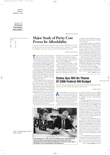Insomnia is the most common sleep complaint in all stages of adulthood. About 30 percent of American adults report sleeping poorly a few nights a week, and 10 percent say the problem is chronic.
About 40 percent of people with psychiatric disorders report chronic insomnia, as do 50 percent of patients in primary care practices.
These individuals typically describe persistent difficulty falling asleep, staying asleep, or falling back to sleep, waking too early, or unsatisfying sleep, even when they have adequate opportunities for sleep. While intensity of symptoms may vary over time, many people report struggling with sleep for years, even a lifetime.
Insomnia disrupts waking life as well. Poor sleepers commonly complain of daytime fatigue, disturbed mood, faulty memory, and trouble thinking. Few report daytime sleepiness, however. Rather, they often report feeling anxious and irritable, a suggestion that persistent hyperarousal plays a key role in the disorder.
A sleep study, or polysomnography, usually the gold standard for quantifying sleep disturbances, is not routinely used to evaluate chronic insomnia, Daniel Buysse, M.D., a professor of psychiatry at the University of Pittsburgh School of Medicine, told a National Institutes of Health review panel. Polysomnographic studies typically confirm a patient's subjective report without revealing the cause for the sleep disturbance. Sleep specialists often use sleep diaries, questionnaires, and activity monitors to document sleep problems and their consequences.
While primary insomnia can occur, most chronic insomnia coexists with other conditions. These include psychiatric disorders that involve depression, anxiety, substance abuse, dementia in the elderly, attention-deficit/hyperactivity disorder in the young, and medical disorders that cause pain, breathing difficulty, and impaired mobility. Such comorbidities no longer are termed “secondary insomnia.” That concept may promote undertreatment, Buysse suggested.
“People used to think of insomnia as a symptom,” he said. That drove practice. Physicians treated the alleged underlying disorder. But evidence now indicates that insomnia can exist independently. It may respond to treatments different from those used for the comorbid disorder. Treating pain in a person with arthritis, for example, he said, still might not relieve the person's insomnia.
When depression and troubled sleep coexist, treatment that resolves the depression sometimes does not improve the sleep disturbance. Treating the sleep problem, however, often benefits the depression. Untreated sleep disturbance may contribute to the recurrence of the depression. Antidepressants sometimes induce periodic limb movements or the restless legs syndrome, further disturbing sleep, and necessitating specific treatment.
